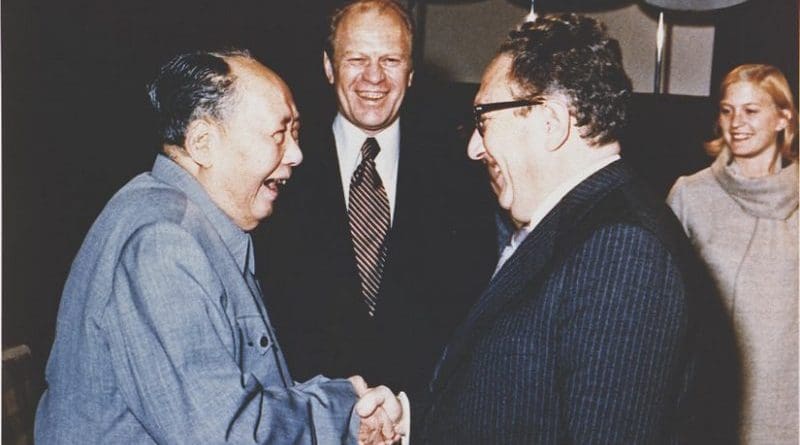Henry Kissinger’s Diplomatic Incapacity – OpEd
There is no doubt that Henry Kissinger was a man of power, but is not true that he was a far-sighted power. On the American side, or rather on the USA side, Kissinger’s diplomatic vision is absolutely negative. In the medium term, let’s say 50 years, all the initiatives of Kissinger’s diplomacy have turned out to be negative for the United States. Let’s take just three examples. The invasion of Laos and Cambodia are two total failures that have caused American policy in Asia to lose credibility. The Vietnamese War was not won, but masses of civilians – about 150,000 – were killed in those two countries. As a result, the U.S. role in Asia became that of an aggressor.
The Mediterranean and Chile. Obsessed with confrontation with the USSR, Kissnger’s diplomacy did not hesitate to take any initiative that would obstruct the democratic path of the communist parties. An absolute diplomatic crime. While a brilliant politician like Moro incorporated the oppositions in order to metabolize them within the DC system – he had succeeded with the PSI, he would have succeeded with the PCI – a politician of power like Kissinger destroyed them by all licit but above all illicit means. In fact, it made the communists popular heroes and nipped in the bud future underground opposition. To confine ourselves to the continent of South America, declared by US President Monroe to be his own backyard, Kissinger was unable to turn them into allies. He used the diplomacy of violence in all its forms. There is now no doubt that U.S. power was disproportionate to the realities of South America, but diplomatic brilliance should have been expressed in the capacity for co-optation, not historical hostility. In South America, the result is that the United States has remained a symbol of oppression and brutality. Diplomatic stains that time does not erase.
But where the failure of Kissenger diplomacy is most total, from an American point of view, of course, is in the case of China. Obsessed with the USSR problem, his apparent genius was to evoke a Chinese power on the ashes of a communist nationalist state. And this has led to China becoming a giant capable of pitting itself against the U.S. in all three of these territories. Is this brilliant? It is not a stretch to say that Kissinger evoked modern China, the country that opposes the United States at the highest levels of the world, and without Kissinger’s opening, China would still be a country without means, poor in technological intelligence and scarce in financial resources. Now that China is rightly a major player in the international arena this is undoubtedly a good thing. The world will have its own peaceful and growing equilibrium when it becomes multipolar, and in addition it is also right that China aspires to total territorial unity, including Taiwan, but from the American point of view if the current China is a threat to the USA it is due to Kissinger.
In essence, Kissinger’s diplomacy, even apart from the brutal exercise of his power, often confused with realistic diplomacy, is a major failure of American policy in South America and Asia.
But Kissinger’s utter intellectual failure is in his inability to understand that his great historical reference, Metternich, controlled the powers by letting them play against each other as such, remaining a power. The weakening of a power unbalanced the balance. It is the same mistake that NATO is making today. By weakening Russia, it empowers imbalances that are difficult to control. Asia first. Metternich’s genius was to understand that for the power of balances – which he managed and exercised – strong powers, not weak ones, are needed. An Allende absorbed into the Western democratic framework as Italian PM Moro would have been able to do, would have ensured the United States a stable power in the “backyard” – according to Monroe – of the northern power. A timely agreement with Vietnam, rather than a cruel escalation of an already lost conflict, extending it to Laos and Cambodia, would have maintained an American role in Southeast Asia. The failure to pursue these goals is a sign of a failure of Kissinger’s diplomatic intelligence that is still damaging the United States today: the brutal exercise of power is not diplomacy.
Today, the world is faced with a great alternative. A unipolar world with a continuation of the post-World War II order or a multipolar order. It may seem to short-sighted American diplomats that maintaining an ancient monopolarity is a symptom of enduring power. But that’s not the case. Free up a third of the budget spent on expensive bases abroad for the U.S., and the U.S. economy acquires an enormous capacity for expansion. Cold War military spending, the logical consequence of monopolarity, being reduced, and American political incidence would increase tenfold. Multipolarity, in addition to being an inevitable historical necessity, is also, from the American point of view, a sensational card of political and economic affirmation. Paradoxically, Trump understands this, Kissinger does not.
In a world that is on its way to becoming – rightly – multipolar, Kissinger is the result of an ancient and antiquated policy of brute power, and Kissinger’s diplomacy in perspective has damaged the United States by creating the new and most powerful and adversary ever, China. The multipolar world needs a progressive Metternich to live and progress, not an old-fashioned Kissinger.

